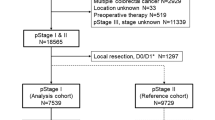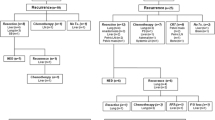Abstract
PURPOSE: This study was designed to determine clinical and pathologic variables associated with poor outcome following resection of Stage B colorectal cancer. METHODS: This was a retrospective study of 117 patients with Stage B cancer who underwent curative surgery and survived the postoperative period. Fourteen clinical and pathologic features were studied. Clinical data were extracted from a prospective colorectal cancer database, and histologic slides were retreived and examined by a pathologist blinded as to clinical details and outcome. RESULTS: After a median follow-up period of 8.2 years, bowel obstruction was significantly related to a poor prognosis (log-rank test; P=0.03). Extensive necrosis (P =0.01) and perineural invasion (P = 0.03) were also associated with decreased survival. Vascular invasion was associated with poor long-term outcome in the subgroup of patients with rectal (P =0.07) but not colonic (P =0.57) cancer. Multivariate regression analysis identified both tumor necrosis (P =0.01) and perineural invasion (P =0.03) as independently related to outcome. CONCLUSION: Further study of prognostic indicators might result in an algorithm to distinguish Stage B cases at high risk of tumor recurrence and death. Such patients could be included in future trials of adjuvant therapies.
Similar content being viewed by others
References
Davis NC, Newland RC. Terminology and classification of colorectal adenocarcinoma: the Australian clinicopathological staging system. Aust N Z J Surg 1983;53:211–21.
Moertel CG, Fleming TR, Macdonald JS. Levamisole and fluorouracil for adjuvant therapy of resected colon carcinoma. N Engl J Med 1990;322:352–8.
International Multicentre Pooled Analysis of Colon Cancer Trials (IMPACT) investigators. Efficacy of adjuvant fluorouracil and folinic acid in colon cancer. Lancet 1995;345:939–44.
Swiss Group for Clinical Cancer Research (SAKK). Long-term results of single course of adjuvant intraportal chemotherapy for colorectal cancer. Lancet 1995;345:349–53.
Allen-Mersh TG, Earlam S, Fordy C, Abrams K, Houghton J. Quality of life and survival with continuous hepatic-artery floxuridine infusion for colorectal cancer liver metastases. Lancet 1994;344:1255–60.
Astler VB, Coller FA. The prognostic significance of direct extension of carcinoma of the colon and rectum. Ann Surg 1954;139:846–51.
Chapuis PH, Dent OF, Fisher R,et al. A multivariate analysis of clinical and pathological variables in prognosis after resection of large bowel cancer. Br J Surg 1985;72:698–702.
Nauta R, Stablein DM, Holyoke D. Survival of patients with stage B2 colon carcinoma: the Gastrointestinal Tumor Study Group experience. Arch Surg 1989;124:180–2.
Clouse LH. Adjuvant chemotherapy in colorectal cancer: mournful, hopeful perpetual motion machine heads to dim light at end of tunnel. JAMA 1989;261:987–8.
Freedman LS. Tables of the number of patients required in clinical trials using the logrank test. Stat Med 1982;1:121–9.
Fielding LP, Stewart-Brown S, Blesovsky L. Large-bowel obstruction caused by cancer: a prospective study. BMJ 1979;2:515–7.
Sasaki O, Atkin WS, Jass JR. Mucinous carcinoma of the rectum. Histopathology 1987;11:259–72.
Fisher ER, Palekar AS, Gregorio RM, Redmond C, Fisher B. Pathological findings from the national surgical adjuvant breast project (protocol no. 4). IV. Significance of tumor necrosis. Hum Pathol 1978;9:523–30.
Jass JR, Love SB, Northover JM. A new prognostic classification of rectal cancer. Lancet 1987;1:1303–6.
Krasna MJ, Flancbaum L, Cody RP, Shneibaum S, Ben Ari G. Vascular and neural invasion in colorectal cancer. Cancer 1988;61:1018–23.
Khankhanian N, Mavligit GM, Russell WO, Schimek M. Prognostic significance of vascular invasion in colorectal cancer of Dukes' B class. Cancer 1977;39:1195–2000.
Kalbfleisch JD, Prentice RL. The statistical analysis of failure time data. New York: John Wiley and Sons, 1980.
Dukes CE. The classification of cancer of the rectum. J Pathol Bacteriol 1932;35:323–32.
Turnbull RB. Cancer of the colon: the influence of the no-touch isolation technique on survival rates. Ann Surg 1967;166:420–7.
Engel HC. Cancer cells in the blood, a five to nine year follow up study. Ann Surg 1959;149:457–61.
Lindeman F, Schlimok G, Dirschedl P, Witte J, Riethmuller G. Prognostic significance of micrometastatic tumor cells in bone marrow of colorectal cancer patients. Lancet 1992;340:685–9.
Wied U, Nilsson T, Knudsen JB, Sprechler M, Johansen A. Postoperative survival of patients with potentially curable cancer of the colon. Dis Colon Rectum 1985;28:333–5.
Talbot IC, Ritchie S, Leighton M, Hughes A, Bussey H, Morson B. The clinical significance of invasion of veins by rectal cancer. Br J Surg 1980;67:439–42.
Horn A, Dahl O, Morild I. Venous and neural invasion as predictors of recurrence in rectal adenocarcinoma. Dis Colon Rectum 1991;34:798–804.
Costa J, Wesley RA, Glatstein E, Rosenberg SA. The grading of soft tissue sarcomas: results of a clinicohistopathologic correlation in a series of 163 cases. Cancer 1984;53:530–41.
Parham DM, Hagen N, Brown RA. Simplified method of grading primary carcinomas of the breast. J Clin Pathol 1992;45:517–20.
Tsujimoto M, Aozasa K, Ueda T, Morimura Y, Komatsubara Y, Doi TI. Multivariate analysis for histologic prognostic factors in soft tissue sarcomas. Cancer 1988;62:994–8.
Parham DM, Robertson AJ, Brown RA. Morphometric analysis of breast carcinoma: association with survival. J Clin Pathol 1988;41:173–7.
Robbins SL, Angell M. Basic pathology. 2nd ed. Philadelphia: WB Saunders, 1976:1–30.
Mulcahy HE, Duffy MJ, Gibbons D,et al. Urokinasetype plasminogen activator and outcome in Dukes' B colorectal cancer. Lancet 1994;344:583–4.
Duffy MJ. The role of proteolytic enzymes in cancer invasion and metastasis. Clin Exp Metastasis 1992;10:144–55.
Tryggvason K, Hoyhtya M, Salo T. Proteolytic degradation of extracellular matrix in tumor invasion. Biochim Biophys Acta 1987;907:191–217.
Bear HD, MacIntyre J, Burns HJ, Jarrett F, Wilson RE. Colon and rectal carcinoma in the west of Scotland: symptoms, histological characteristics, and outcome. Am J Surg 1984;147:441–6.
Fielding LP, Phillips RK, Hittinger R. Factors influencing mortality after curative resection for large bowel cancer in elderly patients. Lancet 1989;2:904–7.
Anderson JH, Hole D, McArdle CS. Electiveversus emergency surgery for patients with colorectal cancer. Br J Surg 1992;79:706–9.
Phillips RK. Clinical factors which influence outcome after colorectal cancer surgery. In: Phillips R, Northover J, eds. Modern coloproctology: surgical grand rounds from St Mark's Hospital. London: Edward Arnold, 1993:69–79.
Welch JP, Donaldson GA. Management of severe obstruction of the large bowel due to malignant disease. Am J Surg 1974;127:492–9.
Willet C, Tepper JE, Cohen A, Orlow E, Welch C. Obstructive and perforative colonic carcinoma: patterns of failure. J Clin Oncol 1985;3:379–84.
Runkel NS, Schlag P, Schwarz V, Herfarth C. Outcome after emergency surgery for cancer of the large intestine. Br J Surg 1991;78:183–8.
Krook JE, Moertel CG, Gunderson LL. Effective surgical adjuvant therapy for high-risk rectal carcinoma. N Engl J Med 1991;324:709–15.
Mulder JW, Kruyt PM, Sewnath M,et al. Colorectal cancer prognosis and expression of exon-v6-containing CD44 proteins. Lancet 1994;344:1470–2.
Ganesh S, Sier CF, Griffioen G,et al. Prognostic relevance of plasminogen activators and their inhibitors in colorectal cancer. Cancer Res 1994;54:4065–71.
Jen J, Kim H, Piantadosi S,et al. Allelic loss of chromosome 18q and prognosis in colorectal cancer. N Engl J Med 1994;331:213–21.
Hamelin R, Laurent Puig P, Olschwang S,et al. Association of p53 mutations with short survival in colorectal cancer. Gastroenterology 1994;106:42–8.
Author information
Authors and Affiliations
About this article
Cite this article
Mulcahy, H.E., Toner, M., Patchett, S.E. et al. Identifying Stage B colorectal cancer patients at high risk of tumor recurrence and death. Dis Colon Rectum 40, 326–331 (1997). https://doi.org/10.1007/BF02050424
Issue Date:
DOI: https://doi.org/10.1007/BF02050424




